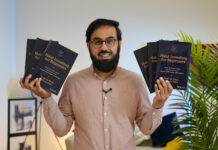Roshan Muhammed Salih reviews John Ware’s BBC Radio 4 documentary “Should Extremism be a Crime,” and argues that if one of Britain’s most controversial journalists believes David Cameron’s counter terror proposals have gone too far then the Prime Minister really might find it difficult to implement his ideological agenda.
Over the past decade the BBC’s John Ware has really made a name for himself in the Muslim community by bashing one Muslim group after another.
The Muslim Council of Britain, Interpal, Hamas, Muslim schools, former Tower Hamlets mayor Lutfur Rahman and a whole array of “non-violent extremists” number among his targets.
So Muslim commentators like me now keenly follow Ware’s career and watch his every move in order to counter his often shallow journalism and sensationalism.
Of course, last night’s Radio 4 documentary contained much of the above, but it also surprised me in that parts of it contained a more thoughtful, nuanced approach.
And its conclusion – that the government shouldn’t ban “non-violent extremists” but should rather defeat them in the arena of debate – directly contradicts Number 10’s more draconian approach.
When did you stop beating your wife?
Subscribe to our newsletter and stay updated on the latest news and updates from around the Muslim world!
Over the years John Ware has perfected the “When did you stop beating your wife question?”
This type of interrogation demands a “yes” or “no” answer and is deliberately designed to trap an interviewee and make him/her look like an extremist.
He often follows up the “wife beating question” by deliberately interrupting the answer before his target can develop a response which gives context, thus leaving the audience with a misleading impression.

Ware displayed this technique when he asked IERA’s Hamza Tzortzis if a Jew could become the leader of an Islamic state – a question designed to portray Tzortzis as an intolerant extremist from the get-go and to prevent any understanding of the reasoning behind his answer which could have enlightened the audience (which is surely the role of a journalist).
This was pure tabloid journalism, reducing the great, rich, deep tradition of Islam to one of its most controversial aspects in the eyes of a Western liberal. This was akin to reducing Western civilization to a yes/no question about the War on Terror or Judaism to a yes/no question about Israel.
Ware also did something of a hit job on 5Pillars own Dilly Hussain, accusing him of sectarianism against Ahmadis.
I’ll let Dilly explain the comments that he made for himself but needless to say he doesn’t hate Ahmadis or support any violent action towards them, although he does follow the mainstream Islamic view that theologically they are outside of the fold of Islam.
The usual suspects
Depressingly, Ware also interviewed two “anti-extremism activists” who are given far too much prominence in the radicalisation debate given their lack of grassroots support and their close relationship with government.
I’m talking of course about Haras Rafiq of the Quilliam Foundation and Rashad Ali (ex Quilliam). Surely Ware could have found more credible voices to interview than people who have a vested interest in the counter-terrorism industry?

I also object to Ware’s portrayal of Muslims as prone to nonsensical conspiracy theories. Sure, some of us might indulge in that but I see no evidence that as a community we are more susceptible to it than others.
And of course Ware had to throw in the usual scaremongering nonsense about the Birmingham Trojan Horse affair, which certainly didn’t find much evidence of extremism but rather shut down some very good schools which had helped children from deprived backgrounds maximise their potential.
It’s almost as if Ware had decided his narrative before he actually started interviewing people and gathering their views. And perhaps his intention was to demonise “non-violent extremists” and whoever he interviewed to reinforce his pre-existing narrative?
A better journalistic approach would have been to conduct the interviews first with an open mind and then decide the narrative afterwards.
Nuance
But then Ware surprised me somewhat by diverting from the Home Office script.
He argued that it would actually be quite difficult to criminalise so-called non-violent extremist ideas and groups. So perhaps there’s some hope for CAGE, MPACUK and Hizb ut Tahrir after all.
He also posed some fair questions about whether the government is just cracking down on “social conservatism” and freedom of belief and speech rather than terrorism.
And he suggested that universities shouldn’t ban “extremist speakers” but should rather challenge them in a debate.
Ware even ended the documentary on a lighter note, sharing a laugh with Hamza Tzortzis and saying that Muslims and non-Muslims needed to have a genuine conversation.
I recall that Ware mentioned that he’d had to “run the gauntlet of personal abuse” for his journalism, but I wonder if some of that criticism has rubbed off on him?
You can follow Roshan on Twitter @RMSalih




















